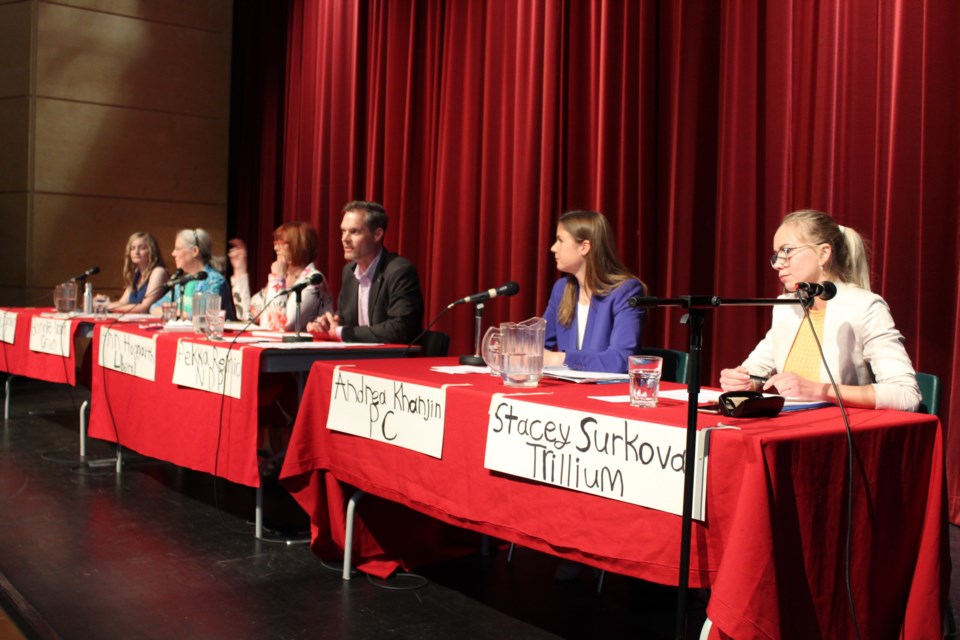High school students are a snapshot of the future.
An all-candidates debate held Wednesday morning at Bear Creek Secondary School in south-end Barrie featured five candidates running to become the MPP representing Barrie-Innisfil once the provincial election rolls around on June 7, as well as one stand-in.
On hand for the debate were Stacey Surkova (Trillium), Andrea Khanjin (Progressive Conservative), Pekka Reinio (New Democrats), Ann Hoggarth (Liberal), Bonnie North (Green) and Amanda Wattie, who was taking part in the debate on behalf of Canadians’ Choice Party candidate Jake Tucker. Tucker was in the audience, but unable to participate due to a bout with laryngitis.
The all-candidates debate was moderated by teacher Jason Rourke, who referred to students as “the next generation of voters” and reminded them that it’s important to vote based on your belief system.
Each candidate was given four minutes to present their party’s platform, followed by a question-and-answer session (and candidate rebuttals) where students stepped up to the microphone in the middle of the packed auditorium.
Issues raised included the minimum-wage increase, climate change, post-secondary school funding, mental-health strategies, sex-ed curriculum and transit/infrastructure.
After the Q&A, the candidates were also given a chance to provide some closing remarks. Following the debate, candidates answered more questions from students during a more informal meet-and-greet on the auditorium floor.
One of the more lukewarm exchanges came when Hoggarth asked Khanjin about her stance on gay-straight alliances, which are often student-led groups that foster safe and supportive environments for the LGBTQ communities in schools.
Hoggarth pointedly asked Khanjin if her party would allow such alliances in schools.
“Miss Khanjin used to work for Jason Kenney, who says he will outlaw them if he is the premier of Alberta,” Hoggarth said. “I would like to know if her government would allow gay-straight alliances in the school.”
Khanjin fired back at Hoggarth.
“Ann, as a fellow female, frankly I think it’s appalling that you think that I have the same opinion as a man,” Khanjin said.
“I think as a young female, and there are many young females here, we all have our own opinions,” she added as the noise level in the auditorium began to rise among the students. “And the PC Party is a party where we believe in equality of outcome and we believe we’re discussing all people’s beliefs, and therefore we’re not going to be banning such things in schools.
“I can have my own opinion and the PC Party has its own opinion,” Khanjin said to applause.
Sex-ed curriculum was a hot topic at Bear Creek, as a student asked Khanjin about her party’s stance on taking a new look at the issue and how it could affect the LGBTQ community.
Khanjin there was not much consultation around the sex-ed curriculum when it was introduced.
“We want to increase that consultation,” she said, adding her party wants to consult a broader range of people, including teachers, parents and retired teachers.
“Look, we don’t want to be creating policy in a silo in some ivory tower at Queen’s Park,” Khanjin said. “We want to leave it to some experts and consult some experts, and that’s what we’re prepared to do.”
Students had differing opinions about what unfolded Wednesday morning at the debate.
Johanna Porter, a Grade 12 student at Bear Creek, said issues such as the raising cost of post-secondary education are crucial for teenagers preparing to move on to college or university in the coming months.
“It’s about how it affects us and our community,” said Porter, who just turned 18 and will be participating in her first election next month. “I think they addressed the issues well and it was informative.”
Madeleine Bower, who’s also a Grade 12 student who just turned 18, said she noticed some of the candidates tried to dodge questions and instead would go into their party platforms to bring the discussion around to other topics.
“We’re big about the environment, so it was good to see them address climate change,” Bower said. “They definitely did answer enough questions, but some went unanswered. It definitely helped me figure out who I’ll vote for.”
Tyler Brittain, a 17-year-old Grade 12 student, said he didn’t like how some of the hopefuls acted during the debate.
“Some of the candidates were being very unprofessional, joking and laughing while the others were speaking,” Brittain said.
Brittain said he liked that the candidates fielded several questions from the student body about mental health, which he called “a very important issue, top of the list.
“There are a lot of people who’ve been diagnosed with anxiety and depression, and it’s become more widespread, especially in high school where more people are becoming aware. People are becoming more confident talking about it.”








